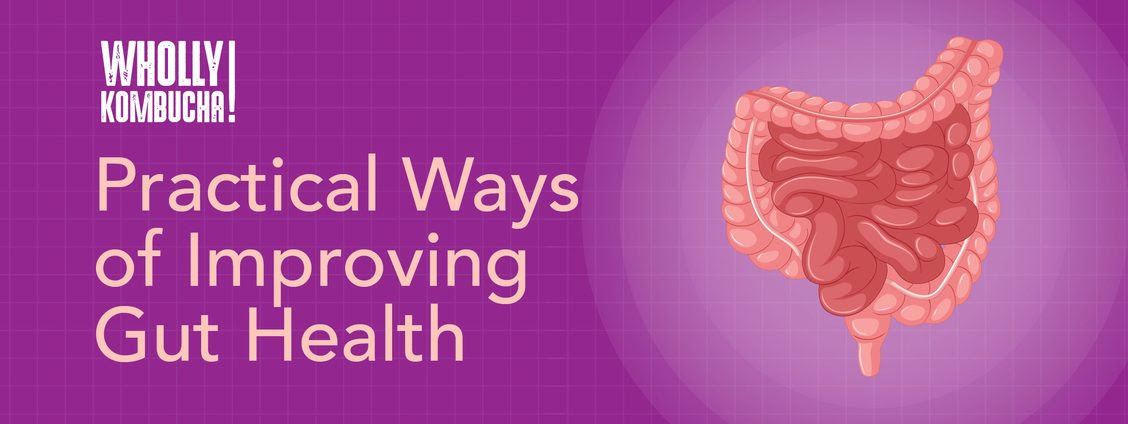Hello again!
And welcome to our third issue of the Well+Gut Newsletter! I sincerely hope that with each read, comes a clearer understanding of how you can help your body work for your good!
|
In our last two issues, we have discussed your gut and what it does for you, and factors that help you recognise that something may be wrong within.
A key takeaway from our previous issues is:
When the balance between the good and bad bacteria is disrupted, it causes inflammation. Inflammation is the root of many (if not all) diseases.
Even mood problems can be attributed to an inflamed gut. We will get to that in our next issue, so please stay tuned.
Today, I am sharing practical ways of improving your gut health.
|
Eat a diverse range of foods:
Remember, a microbiome of diverse bacteria is a healthy one. In essence, a diet consisting of different food types can lead to a more diverse and healthy microbiome. The challenge here is, the traditional Western diet – which many are now adopting, due to its convenience – is highly processed, rich in unhealthy fats and refined sugar, sapping our microbiome of its diversity, and fostering the growth of wrong types of bacteria.
You don’t need to subscribe to a vegan/vegetarian/low carb/weight loss diet to enhance the diversity of your gut microbiome. However, you do want to increase your intake of vegetables, fresh fruits, nuts, legumes, whole grains, and other minimally processed plant-based foods. That’s because fruits/vegetables and plants are naturally rich in fiber; and a proper fiber diet literally feeds and makes the bacteria in your gut thrive.
|
Quick Tip: To reduce your sugar intake at breakfast, consider adding cinnamon, fresh/dried fruits, and/or nut butters to your hot cereals, plain kefir/ yogurt or oatmeal. This eliminates the need for sugar to improve taste.
|
Eat Fermented/Probiotic-Rich Foods:
Including probiotic-rich foods such as Kombucha, Milk Kefir(unsweetened), Sauerkraut, Kimchi can be helpful in maintaining a healthy gut. These foods are especially essential during and after taking a course of antibiotics (as prescribed by your doctor). There’s a lot that needs to be learned about the potency of probiotic supplements, so it’s always advisable to obtain them from food-based sources as listed above, which are known to contain Lactobacillus acidophilus and Lactobacillus rhamnosus – strains of bacteria that are widely known for their ability to maintain/improve gut health. If you are taking supplements, be sure to find out if they contain these strains.
|
Avoid unnecessary intake of antibiotics:
Although it is often necessary to take antibiotics to combat bacterial infections, overuse/misuse is a significant public health concern that can lead to antibiotic resistance.
Antibiotics are damaging to the gut microbiota and immunity, as they are said to deplete your body of bad bacteria (yes), and also good bacteria that your body needs to thrive. According to the American Centre for Disease Control and Prevention, doctors prescribe around 30% of antibiotics unnecessarily. I have been a victim of such circumstances here in Ghana. Our knowledge is indeed power, and it is always recommended that you discuss antibiotics and alternative options with your doctor before use.
|
Get enough rest:
Our body’s need for rest/sleep is often undermined, especially in an era where hard work is defined by a person’s ability to survive on little to no sleep. The truth is, you’re doing more harm than good to your body. Sleep (or lack thereof) even affects the foods you choose to eat the next day. “Most people in a sleep-deprived state make poor food choices because impulse control is lower, hunger and satiety cues get skewed, and the body craves quick calories for energy when under-slept.” Dysregulated sleep translates into dysregulated gut health.
|
Stay Hydrated:
Water is crucial to human life, and it accounts for 50–70% of our body weight. Hydration is one of the most important factors in keeping the gut healthy and improving digestion.Inadequate hydration can impair the body’s ability to maintain its core internal temperature and lead to fatigue, sluggish performance, and slowed digestion. A hydrated gut also promotes better skin, reduces inflammation, and helps with bowel regularity. If you find yourself struggling to drink water regularly, it is beneficial to come up with a strategy.
|
Quick Tips:
- Drink at least 8 ounces of water (or more) when you wake up, before and after meals, and before you go to bed.
- Buy a water bottle that appeals to you, and keeps you sipping throughout the day
- Adding carbonation (a personal favorite) is a nice little treat that improves that taste of water, making it more desirable
- Set up reminders, if you find yourself so busy that you forget to drink water!
|
These quick tips can also help to reduce unnecessary eating habits, as many of us confuse thirst for hunger. The same part of your brain is responsible for interpreting both hunger and thirst signals; so you may go for a snack/meal when you should really be drinking water.
|
That’s all for now, Boochers!
Don’t forget to reach out to us on +233 55 291 5390 if you would like to try our range of probiotic beverages, or if you have any questions!
Till next week! Stay Healthy, Stay Happy!
*Please note that the information shared via this newsletter is not meant to replace any medical advice, but rather to provide guidance on understanding your body better.
|
|
|
